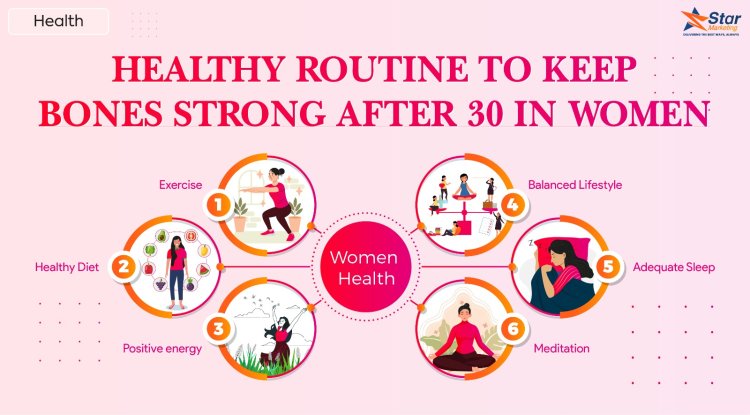Healthy Routine to Keep Bones Strong After 30 in Women
As women enter their 30s, it becomes increasingly important to prioritize bone health. Bones play a vital role in our overall well-being, providing structure, strength, and protection to our bodies. To maintain strong and healthy bones, it's essential to adopt a proactive approach through lifestyle choices and a balanced routine.

Healthy Routine to Keep Bones Strong After 30 in Women
Introduction
As women enter their 30s, it becomes increasingly important to prioritize bone health. Bones play a vital role in our overall well-being, providing structure, strength, and protection to our bodies. To maintain strong and healthy bones, it's essential to adopt a proactive approach through lifestyle choices and a balanced routine.
In this blog post, we will explore a comprehensive and practical routine that can help women keep their bones strong and reduce the risk of osteoporosis and fractures as they age.
1. Maintain a Nutrient-Rich Diet
A well-balanced diet is a cornerstone of healthy bones. Ensure your daily diet includes calcium-rich foods such as dairy products, leafy green vegetables, and fortified plant-based alternatives. Getting adequate Vitamin D is crucial for calcium absorption. Include foods like fatty fish, eggs, and fortified cereals in your diet or consider supplements if necessary. Magnesium, phosphorus, and vitamin K are also essential for bone health, so incorporate sources like nuts, seeds, whole grains, and green vegetables into your meals.
2. Prioritize Bone-Strengthening Activities
By including bone-strengthening activities in your routine, it can provide added benefits. These activities involve higher impact and force on the bones, such as jumping rope, high-intensity interval training (HIIT), or step aerobics. Engaging in activities like these helps to further improve bone density and reduce the risk of osteoporosis. However, starting gradually and progressing safely is important to avoid injury, especially if you're new to high-impact exercises.
3. Get Sufficient Sleep
Quality sleep plays a significant role in maintaining overall health, including bone health. During sleep, the body repairs and rejuvenates tissues, including bones. One should get at least 7 -8 hours of uninterrupted sleep each night. Establish a consistent sleep routine, create a comfortable sleep environment, and practice relaxation techniques to improve the quality of your sleep. If you have trouble sleeping, consult your doctor for guidance to enhance your sleep habits.
4. Monitor Hormonal Health
Hormonal changes, particularly during menopause, can impact bone health. Estrogen levels decline during menopause, leading to increased bone loss. Regularly monitor your hormonal health and discuss any concerns with your doctor. They may recommend hormone replacement therapy or other interventions to support bone health during this transition. Maintaining overall hormonal balance through a healthy lifestyle, stress management, and adequate nutrition can also positively impact bone health.
5. Ensure Sufficient Calcium and Vitamin D Levels
While we mentioned the importance of including calcium-rich foods in your diet earlier, it's equally crucial to ensure sufficient vitamin D levels. Vitamin D helps the body absorb calcium effectively. Spend time outdoors to get natural sunlight, as sunlight is a primary source of vitamin D. You can also include foods like fatty fish, fortified dairy products, and egg yolks in your diet. If necessary, your Doctor may recommend vitamin D supplements to ensure optimal levels. Calcium and vitamin D is recommended to maintain healthy bones, but should only be consumed after consulting a doctor.
6. Practice Stress Management and Relaxation Techniques
Chronic stress can negatively impact bone health. High levels of stress hormone cortisol can interfere with bone formation and increase the risk of bone loss. Incorporate stress management techniques into your routine, such as mindfulness meditation, deep breathing exercises, yoga, or engaging in hobbies and activities that bring you joy. Prioritize self-care and create a healthy work-life balance to reduce stress levels and support overall well-being, including your bone health.
Conclusion
By integrating regular exercise, healthy eating, a balanced lifestyle, and adequate sleep into our daily routines, we can greatly enhance our physical and mental well-being. These habits are not only beneficial for the present but also contribute to long-term health and longevity. Embracing a healthy lifestyle is an investment in ourselves, allowing us to lead fulfilling lives filled with vitality, energy, and resilience.
(Disclaimer: It is important to note that before embarking on any exercise or lifestyle routine, it is highly recommended to consult with your doctor. Every individual's health condition is unique, and what may be suitable for one person may not be suitable for another.)
What's Your Reaction?
















